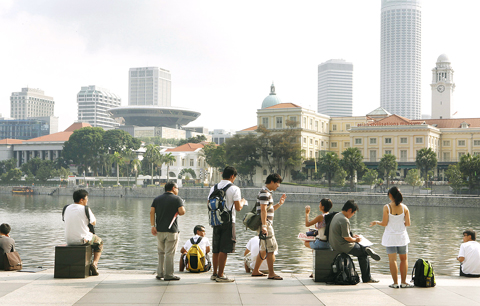Singapore’s economy performed better than estimated in the second quarter, but recovery will be “sluggish” on continued weak demand from the US and Europe, the government said yesterday.
The trade-reliant economy expanded by a seasonally adjusted 20.7 percent in the June quarter from the previous three months, better than the estimated growth of 20.4 percent released last month.
The expansion marks Singapore’s first quarter-on-quarter growth in five quarters and analysts said this suggests the economy is emerging from its worst recession since independence 44 years ago. It followed a quarter-on-quarter dive of 12.2 percent in the first three months.

PHOTO: AP
Second quarter performance was underpinned by strong gains in the manufacturing sector, where output climbed 49.5 percent compared with the previous quarter’s contraction of 18.5 percent.
Manufacturing growth was powered by a surge in the production of active pharmaceutical ingredients used in medicines worldwide and a rise in inventory restocking in electronics.
The construction sector grew 32.7 percent on the back of a resilient property market and the ongoing building of two massive casino projects in the city-state, the ministry said.
However, GDP in the three months to June was still down 3.5 percent year on year, indicating that any recovery would be fragile.
In the March quarter GDP shrank 9.5 percent from the same point last year.
The trade ministry noted that industrial production and consumption in Singapore’s key export markets such as the US and Europe are still weak and unemployment remains high.
“Without a turnaround in these demand-led indicators, any economic recovery in the second half of the year will probably be sluggish and modest,” the ministry said.
As a result, the government is maintaining its forecast for the economy to shrink between 4 percent and 6 percent this year.
In a separate statement, the government’s trade promotion body International Enterprise Singapore (IE Singapore) said key exports rose a seasonally adjusted 7.6 percent in the June quarter from the previous three months.
But compared with the previous year, non-oil domestic exports fell by 14 percent on lower shipments of electronics and non-electronic goods, it said.
Total external trade was up 3.8 percent from the preceding quarter but down 27 percent from a year earlier.
“For the remainder of 2009, external conditions are expected to stay weak,” IE Singapore said.

Rainfall is expected to become more widespread and persistent across central and southern Taiwan over the next few days, with the effects of the weather patterns becoming most prominent between last night and tomorrow, the Central Weather Administration (CWA) said yesterday. Independent meteorologist Daniel Wu (吳德榮) said that based on the latest forecast models of the combination of a low-pressure system and southwesterly winds, rainfall and flooding are expected to continue in central and southern Taiwan from today to Sunday. The CWA also warned of flash floods, thunder and lightning, and strong gusts in these areas, as well as landslides and fallen

WAITING GAME: The US has so far only offered a ‘best rate tariff,’ which officials assume is about 15 percent, the same as Japan, a person familiar with the matter said Taiwan and the US have completed “technical consultations” regarding tariffs and a finalized rate is expected to be released soon, Executive Yuan spokeswoman Michelle Lee (李慧芝) told a news conference yesterday, as a 90-day pause on US President Donald Trump’s “reciprocal” tariffs is set to expire today. The two countries have reached a “certain degree of consensus” on issues such as tariffs, nontariff trade barriers, trade facilitation, supply chain resilience and economic security, Lee said. They also discussed opportunities for cooperation, investment and procurement, she said. A joint statement is still being negotiated and would be released once the US government has made

SOUTH CHINA SEA? The Philippine president spoke of adding more classrooms and power plants, while skipping tensions with China over disputed areas Philippine President Ferdinand Marcos Jr yesterday blasted “useless and crumbling” flood control projects in a state of the nation address that focused on domestic issues after a months-long feud with his vice president. Addressing a joint session of congress after days of rain that left at least 31 dead, Marcos repeated his recent warning that the nation faced a climate change-driven “new normal,” while pledging to investigate publicly funded projects that had failed. “Let’s not pretend, the people know that these projects can breed corruption. Kickbacks ... for the boys,” he said, citing houses that were “swept away” by the floods. “Someone has

‘CRUDE’: The potential countermeasure is in response to South Africa renaming Taiwan’s representative offices and the insistence that it move out of Pretoria Taiwan is considering banning exports of semiconductors to South Africa after the latter unilaterally downgraded and changed the names of Taiwan’s two representative offices, the Ministry of Foreign Affairs (MOFA) said yesterday. On Monday last week, the South African Department of International Relations and Cooperation unilaterally released a statement saying that, as of April 1, the Taipei Liaison Offices in Pretoria and Cape Town had been renamed the “Taipei Commercial Office in Johannesburg” and the “Taipei Commercial Office in Cape Town.” Citing UN General Assembly Resolution 2758, it said that South Africa “recognizes the People’s Republic of China (PRC) as the sole